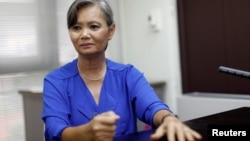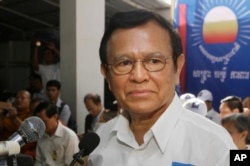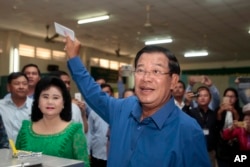Almost half of Cambodia’s opposition lawmakers have left the country or are in jail, including most of its leadership, as proceedings to dissolve the party move forward.
It was no longer possible to “save democracy” from inside Cambodia, said Cambodia National Rescue Party (CNRP) leader Mu Sochua — who fled on Tuesday saying she’d been tipped off her arrest was imminent.
“If there is no democracy and if there is only intimidation and arrest, I think we must find alternative means to push, to promote, and to save democracy in our country,” she said from an undisclosed location abroad.
Opposition on the run
It was better to advocate outside the country than be jailed under a co-opted legal system, said Sochua, who has called for targeted international sanctions on ruling party leaders.
A complaint requesting the dissolution of her party was filed by the Cambodian Youth Party yesterday - citing the widely decried “treason” charge CNRP leader Kem Sokha was arrested on in September.
A controversial recent legislative amendment allows the dissolution of a party found to undermine the security of the nation.
Treason charges
On Monday, Prime Minister Hun Sen warned the treason case against Sokha would be extended, potentially resulting in the arrest of other opposition lawmakers.
“We are conducting further activities. [I] want to send a message that it will not just be done with the arrest of only one person… because this is a preparation and a systematic act,” he said.
“So, I just said this, and other people can understand and they have been conducting rude activities in the three-province already,” he said, referring to Kampong Thom, Preah Vihear, and Siem Reap, all of which Mu Sochua had recently visited.
CNRP chief whip Son Chhay, who is one of the last remaining party leaders in the country, told VOA last week prior to Sochua’s departure that 22 opposition lawmakers had flown to different countries to brief their overseas constituents on the present crisis.
“I think it is beyond what we call the red line. But I know that the alternative for the future of Cambodia must lay in the election, must hang on the practice of democracy,” he said.
“Inside we feel that it’s unacceptable. This crisis is serious against the democracy in our country,” he said, adding the party would continue to wait and observe rather than pull out of the elections completely yet.
At the time he said he was confident many of the lawmakers oversees would come back in October.
Opposition leaders have left country
Those abroad include deputy party president Eng Chhay Eang, spokesman Yim Sovann, deputy public affairs head Kem Monovithya (a daughter of Kem Sokha), spokesman Yem Ponhearith and president of the party’s youth wing, Hing Soksan.
Kong Sophea and Nhay Chamroeun, who were brutally assaulted by members of Prime Minister Hun Sen’s Bodyguard Unit outside the National Assembly in 2015, are also outside the country.
Pol Ham, who is also one of the few remaining senior CNRP leaders left in Cambodia, declined to comment yesterday.
Mao Monyvann, who also sits high in the party hierarchy, said the party would stay strong at the grassroots level even in the absence of many leaders.
“To me, I decided already that I continue to stay with the men and women activists, particularly the 5,007 commune councilors and other leaders. The important thing is that the party president is placed in jail. So, I continue to lead and maintain the sustainability of the party,” he said.
He added that no matter how tense the political situation got, there would eventually be a compromise between the opposition and ruling parties with international pressure just one factor in that process.
Khieu Sopheak, spokesman for the Ministry of Interior, told VOA Wednesday that no new arrest warrants had been issued in connection with Kim Sokha’s treason case, although he alleged Mu Sochua had broken the law by installing banners calling for her party leader’s release.
Sochua, is among at least seven lawmakers who are still under criminal prosecution for their role in a violent demonstration that took place in July 2014.
CNRP Senator Hong Sok Hour is serving seven years and lawmaker Un Sam An faces up to five for charges related to statements or postings they have made about Cambodia’s contentious border with Vietnam.
China backs the government
Sebastian Strangio, author of "Hun Sen’s Cambodia," said trying to ramp up international pressure against Hun Sen from abroad was unlikely to prove an effective strategy for CNRP leaders while the prime minister enjoyed such strong support from China.
“This, of course, is precisely Hun Sen’s aim. With most of its senior leaders now exiled, in hiding, or behind bars, it is hard to see how the party can mount an effective campaign at the 2018 election,” he wrote in an email.
“CNRP leaders would obviously be better off campaigning from within Cambodia, but the government’s repression is making that nearly impossible for the time being. Given recent events, it is unclear whether the CNRP will even exist by the time of the election,” he added.
David Boyle contributed to this report.









